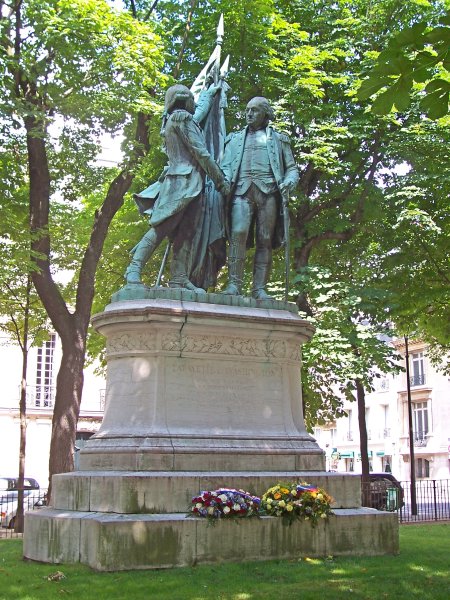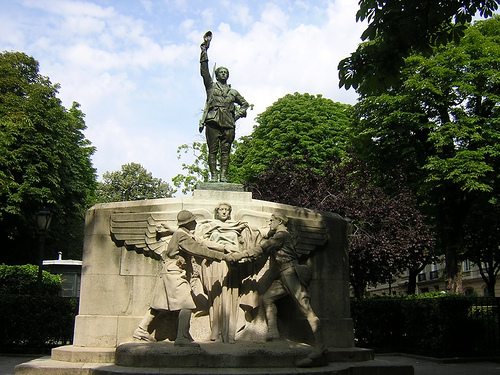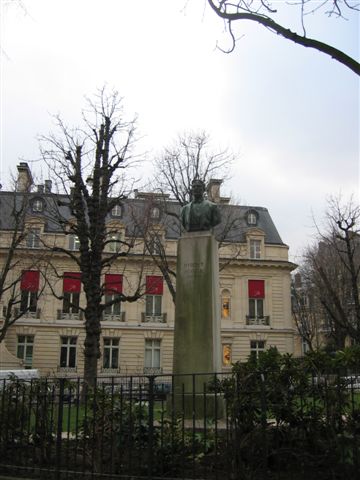États-Unis ≠ Bitche, SVP
« previous post | next post »
Twice a day, walking between my hotel and Acoustics 2008 at the Palais des Congrès, I pass by the Place des États-Unis, which is four street-segments surrounding a block-long median strip, between Avenue Kléber and Avenue d'Iéna. At one end, appropriately enough, there's a statue of Lafayette shaking hands with Washington. At the other end, also appropriately, there's a memorial to the American volunteers who died while serving in the Légion Étrangère during the first world war. The base of the memorial is inscribed with verses from Alan Seeger's "Ode in Memory of the American Volunteers Fallen for France", as translated into French by Alain Rivoire. For example:
Salut frères, adieu grands morts, deux fois merci. Double à jamais est votre gloire d'être morts pour la France et d'être morts aussi pour l'honneur de notre mémoire.
In the original high-Romantic English this was:
Hail, brothers, and farewell; you are twice blest, brave hearts.
Double your glory is who perished thus,
For you have died for France and vindicated us.
In between, less obviously, there's a ten-foot-high plinth surmounted with a bust of Myron T. Herrick.
Mr. Herrick, the invaluable wikipedia tells us, "was a Republican politician from Ohio. He … served as the Governor of Ohio from 1904 to 1906. He subsequently served as United States Ambassador to France from 1912 to 1914 and again from 1921 to 1929, when he died from a heart attack while in office. Herrick was an unsuccessful candidate for the U.S. Senate in 1916 against Atlee Pomerene."
Curiously, it seems that his autobiography was written by Col. T. Bentley Mott.
Anyhow, looking for pictures of these various statues, I learned about the bilingual pun that resulted in the Place des États-Unis gaining its name:
Créée par la destruction des anciens réservoirs de Passy …, la place s'appelait originellement place de Bitche, du nom de la ville de Bitche en Moselle, qui avait vaillamment résisté à l'invasion prussienne pendant la Guerre de 1870.
Mais elle changea de nom très rapidement, lorsque Levi Parsons Morton, ministre des États-Unis d'Amérique à Paris, y établit en 1881 sa résidence ainsi que le siège de la légation qui avait dû quitter ses bureaux inadaptés du 95 rue de Chaillot. En effet, le jeu de mot auquel prêtait, en anglais, la dénomination originale[2] émut jusqu'au département d'État de sorte que, sur l'insistance du chargé d'affaires, le Préfet de Paris accepta de rebaptiser la place tandis qu'une place du 19e arrondissement prenait le nom de place de Bitche.
Created by the destruction of the old Passy reservoirs, this square was originally called "place de Bitche", from the name of the town of Bitche in Moselle, which had valiantly resisted the Prussian invasion during the war of 1870.
But the name changed quickly when Levi Parsons Morton, American ambassador in Paris, established his residence and the site of the embassy there in 1881, having had to leave the inappropriate offices at 95 rue de Chaillot. Indeed, the pun that the original name[2] suggested in English moved the state department to the point that, on the insistance of the chargé d'affaires, the Mayor of Paris agreed to rebaptise the square, while a square in the 19th arrondissement took the name of place de Bitche.
The American embassy has long since moved a couple of kilometers east, but the place des États-Unis retains its name.
The French wikipedia entry explains the pun like this:
[2] bitch : femme de mauvaise vie
which is not quite right in terms of contemporary usage, where the slang term bitch is mostly used to suggest that a woman is malicious and unpleasant. But as you could guess from the residue in the insulting phrase "son of a bitch", it seems that through the 19th century, the OED's sense 2.a. was retained:
Applied opprobriously to a woman; strictly, a lewd or sensual woman. Not now in decent use; but formerly common in literature.
a1400 Chester Pl. (1843) 181 Whom calleste thou queine, skabde biche?
1575 J. STILL Gamm. Gurton II. ii, Come out, thou hungry needy bitch.
1675 HOBBES Odyssey XVIII. 310 Ulysses looking sourly answered, You Bitch.
1712 ARBUTHNOT John Bull (1755) 9 An extravagant bitch of a wife.
1790 WOLCOTT (P. Pindar) Adv. Fut. Laureat Wks. 1812 II. 337 Call her Prostitute, Bawd, dirty Bitch.
In the end, I did find the pictures I was looking for. Here's Lafayette and Washington:
Here's the WW I memorial:
And here's the bust of Myron T. Herrick:



Bunny Mellon said,
July 3, 2008 @ 4:05 am
Lovely story. It's a good thing they had changed the name by the time Pamela Harriman became Ambassador.
Laurent C said,
July 3, 2008 @ 4:36 am
Nice story indeed.
As a native French speaker, I must say that it is common in France to believe the first sense of bitch is prostitute. This is indeed probably due to the parallel between "son of a bitch" and "fils de pute" (or "enfant de putain").
(English speakers tend to be similarly confused about French foutre, which may have very rude, and innocent meanings).
Dan Milton said,
July 3, 2008 @ 11:09 am
When Myron Herrick was the American Ambassador in Paris, Jean Jules Jusserand was the French Ambassador in Washington. He doesn't have a bust but is commemorated by a granite bench in Rock Creek Park.
Jean-Sébastien Girard said,
July 3, 2008 @ 11:39 am
For the record, Laurent, Quebecers don't have that problem. We do surprise English speakers with our liberal use of "fuck" though. It is a fairly mild curseword around these parts.
David Eddyshaw said,
July 3, 2008 @ 11:51 am
It's interesting if "fuck" is less rude for quebecers than for typical anglophones, given that "foutre" is much less offensive in French than "fuck" in English. I suppose it's a sort of calque phenomenon. How about the English equivalent of "con" in Quebec? Is it similarly denatured?
Bill Poser said,
July 3, 2008 @ 12:01 pm
In a glade in the Endowment Lands of the University of British Columbia there is a bench with a plaque in memory of the Austrian consul and his horse, whose names I do not recall, who spent many pleasant hours together on the trails.
JJM said,
July 4, 2008 @ 11:34 am
Actually, "fuck" long since passed into Canadian French as "foquer." And "foquer" has nowhere near the shock value the original English word possesses – as Jean-Sébastien pointed out.
Something like "tout foqué" has little more import than saying "all screwed up" in English.
Aaron Davies said,
July 6, 2008 @ 10:09 pm
Reminds me of Fleming's use of "bitch" in the Bond novels, something I always wondered about. It certainly doesn't correspond to the modern meaning, which I agree with Mark on, but nor does it quite seem to match the specific senses quoted from the OED. The most famous use is probably from the end of Casino Royale ("The job's done; the bitch is dead.") but there are several places where Bond refers to some woman as a "silly bitch" without seeming to mean very much insult by it. Perhaps Fleming used it similarly to "wench"?
Marc A. Pelletier said,
July 7, 2008 @ 3:08 pm
@David Eddyshaw
In fact, "con" has been quite entirely sanitized in Quebecois. It now means "stupid", and not in a particularly offensive or vulgar way. A close cognate in American English would be "dumb".
Nothing is left of its sexual meaning whatsoever.